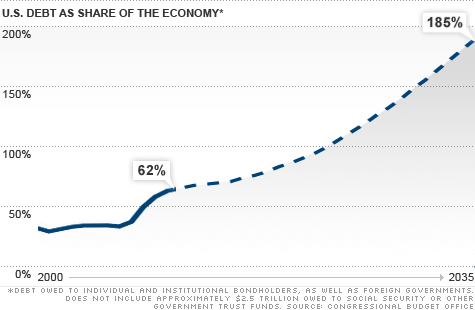
NEW YORK (CNNMoney.com) -- Starting next month, lawmakers will argue until they are hoarse over what to do about various spending bills and the Dec. 31 expiration of the Bush tax cuts.
But make no mistake: The fevered debates will take place in a vacuum.
That's because lawmakers have yet to seriously address how to rein in the country's long-term debt. And that broader debate will involve significant policy changes: A likely overhaul of the federal tax code and a reduction in spending across the board.
Policymakers have been mostly mum on the issue. By December, however, they will have a harder time ignoring the matter, since they will have in hand reports from the Bipartisan Policy Center's Debt Reduction Task Force and President Obama's fiscal reform commission.
Both panels will starkly lay out the magnitude of changes needed to correct for two unpleasant realities.
The first is a combination of habit and circumstance.
For years, the country was spending more than it was willing to pay in taxes, and then it was hit by a gob-smacking economic and financial crisis that spurred a lot more spending to stem the pain of the downturn.
The second reality, however, is more worrisome to budget experts. Even after the economy recovers, the gap between money out and money in will persist largely because of long-anticipated demographic changes such as the aging of the population. And borrowing to fill that gap could become much more expensive than it has been.
This year, U.S. debt held by the public, which does not include money owed to Social Security and other government trust funds, will top 60% of the country's economy as measured by gross domestic product. By 2022 it is projected to reach 100%. And by 2035, it's on track to approach 200%.
By comparison, the average debt held by the public between 1960 and 2000 was just 37%, according to information from the debt reduction task force.
The large leaps in indebtedness mean, among other things, that by the end of this decade, the vast majority of all federal tax revenue will be swallowed up by just four things: Interest payments on the country's debt, and the payment of Medicare, Medicaid and Social Security benefits.
By 2021, the cost of annual interest payments alone would top that of the defense budget and itself eat up more than half of all federal taxes, according to information from the debt reduction task force.
Getting the federal ledger on a more stable track means that future legislative dogfights won't be about what breaks to offer voters so much as what sacrifices to ask of them.
"If we have not asked Americans to sacrifice, we have failed," said former Sen. Pete Domenici, R-N.M., who co-chairs the debt reduction task force with Alice Rivlin, the former White House budget director under President Clinton.
"And if we have asked you to sacrifice and you choose not to do it, we've failed again because we haven't convinced you that this is one of the few ordeals facing America that is as bad as being in a war," added Domenici, who used to head the Senate Budget Committee.
The task force, and the president's commission, have said that the entire federal balance sheet is on the table. And they're both likely to recommend spending freezes, a serious curtailment of many tax breaks and various reforms to entitlement programs, to name just a few.
Still, neither Domenici nor Rivlin believes the effort to deal with the country's long-term debt will be all spinach and no sugar.
"In every major problem that a great country like ours has, there is a silver lining," Domenici said. His group, for instance, will propose ways to simplify the federal tax code, which both parties have wanted to do for a long time.
Whether Congress chooses to adopt either group's suggestions is impossible to say. Many deficit hawks believe it will take nothing short of a crisis for Congress to act. A crisis such as the fall of the dollar, loss of confidence in U.S. ability to pay what it owes, rampant inflation, or a sovereign rating downgrade.
Rivlin is more optimistic.
"My hope is that after the [mid-term] election, both parties will see the advantage of working together to get part of this problem behind them," she said. "I believe people are sensible enough to come to grips with this problem long before we're facing a downgrade of U.S. debt." ![]()






| Index | Last | Change | % Change |
|---|---|---|---|
| Dow | 32,627.97 | -234.33 | -0.71% |
| Nasdaq | 13,215.24 | 99.07 | 0.76% |
| S&P 500 | 3,913.10 | -2.36 | -0.06% |
| Treasuries | 1.73 | 0.00 | 0.12% |
| Company | Price | Change | % Change |
|---|---|---|---|
| Ford Motor Co | 8.29 | 0.05 | 0.61% |
| Advanced Micro Devic... | 54.59 | 0.70 | 1.30% |
| Cisco Systems Inc | 47.49 | -2.44 | -4.89% |
| General Electric Co | 13.00 | -0.16 | -1.22% |
| Kraft Heinz Co | 27.84 | -2.20 | -7.32% |
|
Bankrupt toy retailer tells bankruptcy court it is looking at possibly reviving the Toys 'R' Us and Babies 'R' Us brands. More |
Land O'Lakes CEO Beth Ford charts her career path, from her first job to becoming the first openly gay CEO at a Fortune 500 company in an interview with CNN's Boss Files. More |
Honda and General Motors are creating a new generation of fully autonomous vehicles. More |
In 1998, Ntsiki Biyela won a scholarship to study wine making. Now she's about to launch her own brand. More |
Whether you hedge inflation or look for a return that outpaces inflation, here's how to prepare. More |